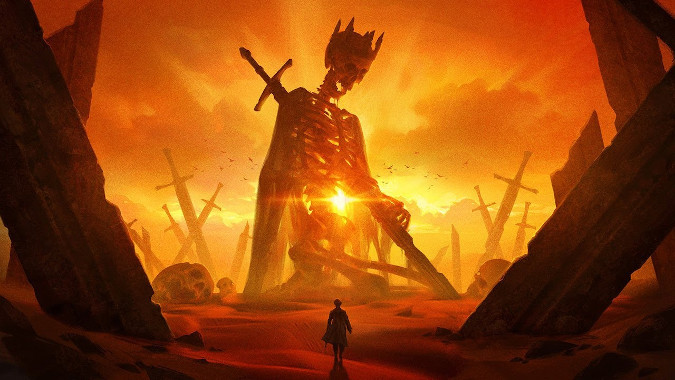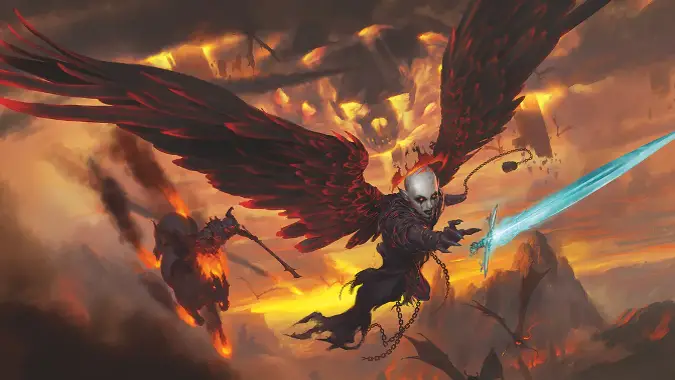Learning to improvise in Dungeons and Dragons: How to salvage a session when your players are Chaotic Neutral

Tabletop players are unpredictable — that’s what makes Dungeon Mastering fun, ultimately. Experience will teach you not how to outmaneuver them, but rather, how to best use the madness they bring to the advantage of the shared story you’re working on. When you’re running an RPG, be it Dungeons and Dragons or Pathfinder or a session of Brave New World, you’ll often be aided by the players as much, if not more, than they’ll make it challenging for you. In fact, you can and should embrace the complications and challenges that they bring.
But sometimes, something you didn’t anticipate happens and you need to grapple with it quickly. Let’s say, hypothetically, you stay up all night designing an encounter for your group. You decide as a fun little thing to put in an ability that makes your semi-techno-zombies not only immune to necrotic damage, but in fact, they gain temporary hit points from it, up to their max hit points. It’s 2 am when you come up with this, you figure it’s not that big a deal and it’ll mostly be funny, and to compensate you make them take double damage from cold attacks so that the players will have a way to take them down fast if the worst happens. And then one of your players whips out this new ability they got that does a metric butt-ton of necrotic damage — and it’s an AOE. Suddenly, they just gave all of the techno zombies like 80 HP apiece.
So what do you do? Do you just throw them into an encounter that’s suddenly way, way more challenging than you expected? Sure, absolutely! But you can also take steps to mitigate the unforeseen consequences of your mistake.
Let’s talk about how to go about doing that.

Remember your own countermeasures
When you design an encounter like that, don’t forget that you built in a safeguard to your ill advised necrotic damage idea. Before you even start that encounter be sure to make subtle hints to the players that the creatures are vulnerable to cold — maybe you’ll even get lucky and one of the players will think to get the zombies to run across the dangerous ice bomb trap you deliberately put there just for that contingency. Help them out by setting up a scene where the zombie monsters are obsessively repeating a task and eventually one of them will think to lure said zombies over said trap.
Trust me, someone always thinks to do that.
The point here is to make sure that if there’s a countermeasure, your players have a fair chance to figure it out or stumble upon it. Sure, you want there to be hard encounters for your players to, well, encounter — that’s the whole point of combat in Dungeons and Dragons, after all, to give the players a fun time overcoming something. But it shouldn’t be impossible for them to figure out what to do.

You are not required to do exactly what the module says
Let’s say you didn’t design this encounter yourself, because you’re smarter than me and you know that the night before the game you should probably sleep instead of staying up all night working on it and you can just run a pre-made module for your group and they’ll be perfectly happy. The module is quite suitable to your group but it’s actually for a group a couple levels higher than they are, which you figure won’t be a problem — your players routinely annihilate fights that are a higher CR than the party, they’re tactical geniuses.
But for whatever reason, half way through the encounter, a feature of the encounter you weren’t really paying that much attention to when you started utterly wrecks everyone. Maybe there was a lair action that does AOE fire damage equivalent to a Dragon’s breath weapon, or rocks fell and landed on several characters and suddenly the Cleric and Ranger are both about to go down at once because the lair action doesn’t allow for a saving throw. So what do you do?
Well, feel free to change it. You can just put in a saving throw even if there isn’t one listed. You can reduce the damage the falling rocks do so that it’s painful but not cataclysmic. Always remember, you’re the one running this game, it’s not running you.

If the players come up with a solution, let it work
You set up a huge army of demons fighting an army of devils, with a group of even worse monsters around the strange temple complex for the players to come up with a way around it. If they try to fight their way through, they could do it — the armies are fighting each other, they won’t necessarily even notice a group of powerful level 14 adventurers until they’ve already made their way through. But it’ll take a long time, so you’ve budgeted that this could be a battle that takes all session, if that’s what the players decide to do.
But then one of them decides to try and befriend Verth, the Dragon That Destroys, a powerful Chaotic Neutral god of exactly that in your campaign setting, and actually manages to pull it off. What do you do? Well, you kill two fiendish armies with one gargantuan avatar of a god, and also tie in a one shot you ran for the group literally almost a year ago where they were playing level 13 adventurers exploring an ancient volcano. That whole session? Yeah, it was the player who made buddies with Verth’s fault that the characters they were playing got taken out by an enormous dragon monster. And now that giant dragon monster? It’s decided the Bard is it’s friend, so it’s nuking the demon and devil armies with gouts of molten rock.
Now, you’ve just rewarded the players for being weirdos who try and befriend Old Gods, cleared the path for them in an epic scene of destruction that you even let the Bard control via a mind link, and the party is more tightly bound to the events of the campaign. And all this because the party Cleric refused to talk to her own god, meaning that you needed to come up with a new scene on the fly.
Basically, what I’m telling you is this — never be afraid to change things up as you’re running the game. Never feel constrained by what you designed, required to run a module exactly as written, or afraid to let player actions dictate the course of the story. Indeed, you should absolutely encourage them. After all, what’s the worst that could happen? Hypothetically. And don’t be afraid you encourage yourself — a DM is also playing, and it’s worthwhile to remember that.
Please consider supporting our Patreon!
Join the Discussion
Blizzard Watch is a safe space for all readers. By leaving comments on this site you agree to follow our commenting and community guidelines.
 @MatthewWRossi
@MatthewWRossi



